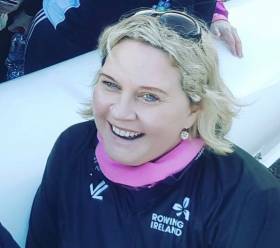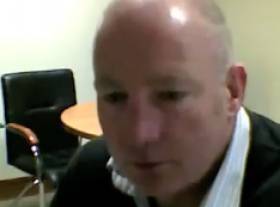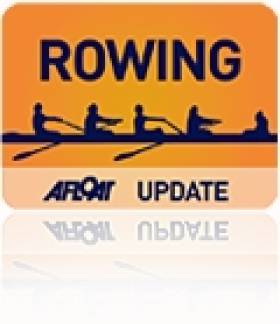Displaying items by tag: Hamish Adams
Carpenter to be First Woman CEO of Rowing Ireland
#Rowing: Michelle Carpenter has been chosen as the new chief executive of Rowing Ireland. She will succeed Hamish Adams who recently left the position to take up the role of CEO with Athletics Ireland.
Carpenter has held a number of significant management positions during her career, including overseeing the development and management of the successful Get Going…Get Rowing programme.
In her early corporate career, Michelle spent eight years working in Europe, firstly at the Council of Europe, Strasbourg, before moving to European Central Bank in Frankfurt in 1999 to be part of the Euro 2002 information campaign.
Originally from Limerick, Michelle was one of the first registered female rowing members of Shannon Rowing Club, rowing in their first winning women’s championship crew of 1988.
Carpenter is currently working with the World Rowing development team on the Olympic Values Education programme. In 2017 she was selected by World Rowing to be a participant at the IOC Women in Leadership forum in Lausanne.
Commenting on her new role, Carpenter said: “I am honoured to be appointed as CEO of Rowing Ireland it is an exciting time for our sport. Having been involved in Irish rowing for over 30 years, I am looking forward to contributing to the growth and success of the sport across Ireland in the future.
“I am passionate about our sport and supporting our clubs and volunteers for the future will be key to our organisation’s development, together with underpinning our successful High Performance, Get Going…Get Rowing and Coach Education programmes.
“2018 will be a very exciting year for Rowing Ireland with our international ‘Festival of Rowing’ commencing in July with the Irish Championships, leading into the Home Internationals and finishing with the prestigious Coupe de la Jeunesse.”
Commenting on the new appointment, President of Rowing Ireland, Eamonn Colclough said: “Michelle has emerged from the extremely robust and intensive recruitment process which we conducted to source the best possible candidate. I congratulate her, the first woman to be appointed to the demanding role of CEO of Rowing Ireland. I am confident that she will build on the success we have enjoyed in recent years and provide dynamic leadership to drive further growth and success in the years to come.”
Adams Leaves Rowing Ireland to Head up Athletics Ireland
#Rowing: Rowing Ireland chief executive Hamish Adams is to leave his post to take over as chief executive of Athletics Ireland in May.
Adams had done the job for five years, arriving after a time of disruption and steadying the ship. The sport expanded domestically and was very successful on the international stage. The New Zealander had been a rugby player and the academy manager of Munster Rugby. He took over the rowing post after serving as acting chief executive and then player services advisor with the Irish Rugby Union Players Association.
Eamonn Colclough, the president of Rowing Ireland, said: “Hamish has worked tirelessly for our organisation and has delivered incredible success across all our strategic areas. Since joining Rowing Ireland, Hamish has been responsible for overseeing organisational change which has seen Rowing Ireland become one of Ireland’s most eminent sporting bodies. We are committed to ensuring further success for all our stakeholders and we will now undertake a robust recruitment process to find a suitable replacement for Hamish.”
Adams said: “While sorry to be leaving Rowing Ireland after five great years with the many great people I’ve had the privilege of working with and for, I’m excited by the new opportunity and challenge of leading Athletics Ireland. I am very proud of all that we have achieved during my tenure both in high performance and participation, from the delivery of an Olympic medal to the establishment of the Get Going…Get Rowing programme and I am confident that with the robust governance structures established, Rowing Ireland will continue to deliver further success.”
#ROWING: Christian Brothers College and Cork Boat Club today signed a joint Memorandum of Understanding at the College in a signing ceremony which moves the longstanding close relationship between the College and the rowing club to a more formal basis.
This follows the recent decision by Christians Brothers College Board of Management to invest in rowing boats and equipment to enhance the facilities available to its students, and to work closely with Cork Boat Club to take advantage of the excellent coaching and training facilities at the club.
The chief executive of Rowing Ireland, Hamish Adams, attended the signing of the agreement between Christian Brothers College and Cork Boat Club and said “Rowing Ireland is delighted to endorse this joint initiative between Cork Boat Club and Christian Brothers College. Such a positive relationship advancing Schools and Club rowing through one of the most successful Clubs in the country is very innovative and encouraging for the future of our sport.”
Dr. Larry Jordan, Principal of Christian Brothers College, added: “We are delighted to work closely with Cork Boat Club to avail of the excellent equipment, facilities and coaching at the club. Their ethos and ours are very complimentary and the relationship has allowed the college to develop rowing as a sport, as a result of which the College is already competing well at schools competitions both in the UK and Ireland. Many of our past rowers have gone on to row at university level and at the highest levels of rowing both nationally and internationally and are sources of great pride for the College.”
Karen McCarthy, Captain of Cork Boat Club, said: “We are very focused on developing schools rowing, and in fact supported six different schools at the recent Schools Rowing Championships with boats and coaches. The relationship with Christian Brothers College has been a very positive one and we are delighted to now work more closely with the College to develop deep rowing talent in the coming months and years.”
Cork Boat Club is the largest rowing club in Cork City and in 2014 won seven national rowing championships. In 2014 it also had the distinction of being the club with the most rowers selected to represent Ireland in various international competitions.































































